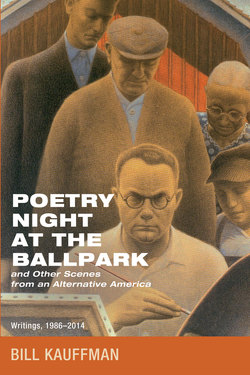Читать книгу Poetry Night at the Ballpark and Other Scenes from an Alternative America - Bill Kauffman - Страница 18
На сайте Литреса книга снята с продажи.
From the Outhouse to the White House
ОглавлениеThe American Enterprise, 1997
The things writers do for money.
Nathaniel Hawthorne wrote his wife, “I want nothing to do with politicians—they are not men; they cease to be men, in becoming politicians. Their hearts wither away, and die out of their bodies.” But that was before Hawthorne’s old Bowdoin College chum, the affable Franklin Pierce, won the 1852 Democratic presidential nomination. Hawthorne dashed off an encomiastic Life of Franklin Pierce, and was rewarded with a consulship at Liverpool.
Salem’s Nat was mucking about in fertile soil. The campaign biography, with its often hilariously fulsome tributes, had been a staple since Andrew Jackson was lauded in a volume by Senator John Henry Eaton (whose barmaid wife had so offended Mrs. John C. Calhoun). Thirty such books were written for candidate William Henry Harrison in 1840, as the Virginia aristocrat metamorphosed into a cidery man of the people.
The astonishing thing is that so many accomplished novelists joined the deluge. William Dean Howells, not yet twenty-five, did the honors for Abraham Lincoln in 1860, and so he spent the war as a consul in Venice rather than as a blue-coated soldier. (Howells later penned a bio of his wife’s cousin, Rutherford B. Hayes.) Lew Wallace (Ben Hur) put Benjamin Harrison aboard a chariot of his own, and Kenneth Roberts strove to animate Calvin Coolidge (though his mention of Silent Cal’s Indian blood panicked the boys at the Republican National Committee).
Historian Edmund B. Sullivan laid down the rules of the genre, including:
—“Stress humble beginnings . . . a birth in a log cabin or on a farm is helpful, or in a small frame house. . . . [I]f the candidate was ever associated with New York City, gloss over that fact.”
—“Play down specific religious beliefs; emphasize vaguely positive feelings toward religion.”
—“Ex-generals must be basically men of peace.”
—“Stress favorable nickname, if masculine sounding; invent one, if necessary.” (Yet how in 1988 could “Poppy” have defeated “Duke”?)
The candidate’s rise from lowly station to colossus is Algeresque; and indeed, Horatio himself wrote From Canal Boy to President, a life of James Garfield.
Widowed mothers were especially prized. Of Kentucky’s Great Compromiser, one biographer swooned, “Much as we admire Henry Clay . . . the Statesman . . . yet do we love far more to dwell upon the ‘orphan-boy’ following the plough in the slashes of Hanover, and occasionally trudging his way, with a grist of corn, to a distant mill, to provide bread for a widowed mother and younger brothers and sisters.”
Sophisticated moderns may laugh, but much of the corporate-media coverage of Bill Clinton belonged to this school of hagiography—though previous generations had the taste not to drag alcoholic stepfathers into the picture.
Surveying the field in 1956, James D. Hart singled out for meritorious silk-purse-making the McKinley biographer who marveled of his subject that “his shoes are always polished” and “he shaves himself . . . never cuts himself . . . and can carry on a conversation while cutting off his beard.” A Thomas Dewey idolator praised the Owosso prig’s height of five feet, eight inches because it was “almost precisely the same as the average of the men in the armed forces.”
Hart opined that the campaign bio “still flourishes . . . as indestructible as the folk dream of the log cabin,” but the old grey fare she ain’t what she used to be.
They’re still written, of course, but men of letters are no longer on such intimate terms with men of state. John Tyler, for instance, sent Washington Irving to Spain and John Howard Payne (“Home Sweet Home”) to Tunis. Even Grover Cleveland, Uncle Jumbo, who didn’t devour fiction in quite the same way he made slabs of beef disappear, counted among his confidants Harold Frederic (The Damnation of Theron Ware). Yet when contemporary presidents look beyond the Potomac for ambassadors and friends, they select washed-up actors or courtesans. Harold Frederic, meet Babs Streisand.
Saul Bellow toyed with the idea of a Humphrey book in 1968, but the genre today is thoroughly hack-ridden, and besides, the ghosted “autobiography” has become the volume of choice. Politicos who shamelessly read other men’s words at poignant passages in their lives (Teddy Kennedy eulogizing a slain brother, Bob Dole bidding farewell to the Senate) may as well tack their own names onto the covers of campaign bios, making them autobios and gaining royalties withal.
But maybe everything that dies someday comes back. For at this very moment might some ambitious scrivener be sweating over Plowboy From St. Albans: The Life of Albert Gore?
